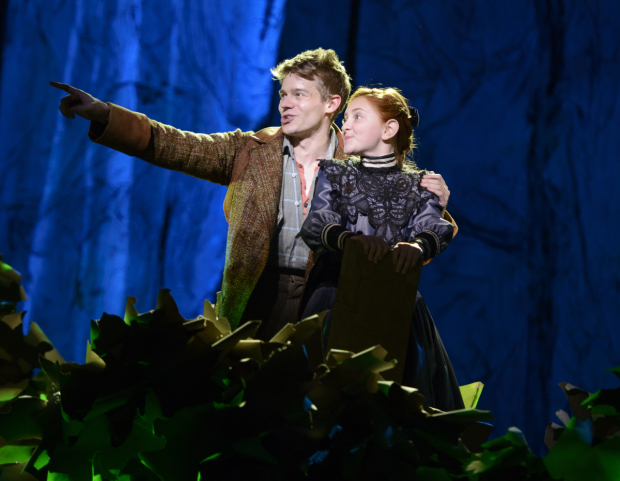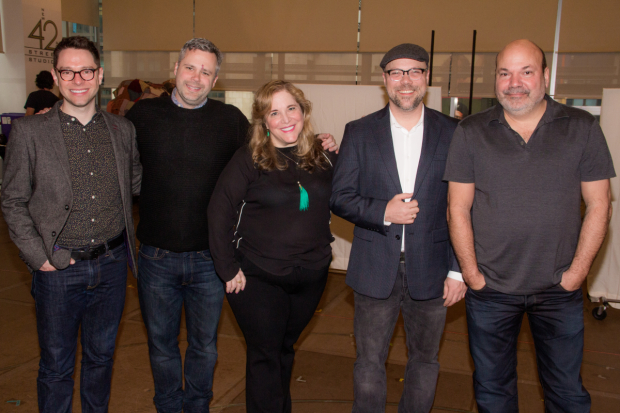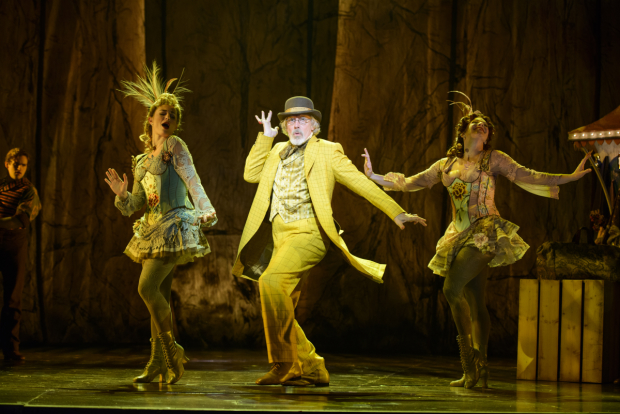Partners in Crime: Claudia Shear and Tim Federle on Adapting Tuck Everlasting
The unlikely pair cowrote this new Broadway musical inspired by Natalie Babbitt’s classic novel.

(photos courtesy of the production)
"The serendipity was insane," recalls Claudia Shear. "[Producer] Beth Williams met with a man named Barry Brown, who came in and said, 'I want to make Tuck Everlasting into a musical.' The same day, [songwriters] Chris Miller and Nathan Tysen came in for a general meeting and said, 'We want to do Tuck Everlasting.' Beth calls me. She says, 'Casey Nicholaw's directing.' I had seen The Drowsy Chaperone like four times. I was in."
Six years later, Shear's unexpected musical baby, Natalie Babbitt's Tuck Everlasting, is in rehearsals to make its Broadway debut at the Broadhurst Theatre, where it begins performances March 31. As the journey progressed, she gained an unexpected but welcome companion: former Broadway actor (Gypsy) and young-adult fiction author (Better Nate Than Ever) Tim Federle, who has recently joined her on the bookwriting team.
Even that choice had a bit of serendipity to it. "Tim had been part of the first reading, as Casey's assistant," Shear notes. "I've known Casey," Federle says, his voice trailing off— "It's been ten years since we were in tech for the first tour of Spamalot, where I was the first dance captain. And so I feel like Casey and I are reformed chorus boys." "Which I am not," Shear adds with a laugh.
Shear and Federle, who both have major theatrical experience but are virgins when it comes to writing musicals, have schooled themselves in this uniquely collaborative process, gaining some valuable skills along the way.

(© Greg Mooney)
Claudia Shear: Number one: Your best idea becomes a song. Your best line becomes a lyric. You either clench and be unhappy about that, or you're thrilled. I always say, there's the book and there's the straw. And then you give it to Nathan and Chris and Casey and they spin it into gold.
Tim Federle: When I write fiction, it's always first-person, present [tense]. For musicals, it's such a different way of storytelling. A lot of Winnie's journey in the book is written in third-person, so it's delicate to tell it in a different way. But that's the great thing about Casey, who's so definitive about storytelling.
Claudia: I said to Casey, "When you were in the back, going tippety-tappety, tippet-tappety," were you also like, "They should cut that bit in the first act?," and he's like, "Always." It's a visceral understanding about the kinetic forward motion.

(© David Gordon)
Tim: What Claudia said about your best line becomes a lyric in the show, that's a great insight. There was a little throwaway moment where Andrew Keenan-Bolger's character and Winnie want to sneak out after midnight. They go to the fair, and there's a moment where Jesse says something along the lines of, "Come be my partner in crime." Nathan said, "That's a lyric idea."
Claudia: I was reading [the scene in the novel] where Mae is getting dressed. My mother worked in cosmetics, and she would say, "You can always tell a woman's most beautiful day because you could see the day that her makeup froze. Be it the lips, or the arched eyebrows, and this is what she felt was her most beautiful day. I sent the whole story of my mom, along with my favorite sonnet by Shakespeare — "When I consider everything that grows / Holds in perfection but a little moment" — to Nathan. When you read that sonnet, which I recommend everyone should, you'll see how it fits. They spun that into "My Most Beautiful Day," which is the most beautiful song by far.
Tim: There's something so mysterious about the creative process. Often the biggest things come out of the tiniest ideas. Not giving anything away, but there's a big dance number in the show that is just as much about story as it is movement. You go, "This is why it has to be a musical." This is a moment that we could only do with this music with these steps.
Claudia: It's got an emotional power. There's a complexity to Chris Miller's music that's like Copeland. I have an obsession with research. When we were working on the fair, because I decided there has to be a fair, I would send Casey [photos of] fairs from 1850. Casey is somebody who can take that all in. This has layers upon layers that I think people are going to be very impressed by.
This show is so gentle and it's a loud season. I hope people can hear us.
Tim: The big thing is that we don't call Tuck a children's book. It's a book that was written for children, but has become beloved by generations. My books have not been out long enough to know if they're beloved by anybody besides me and my mother, but I have learned, in writing for young people, that your bigger readership is grown-ups, cool aunts and uncles, and teachers.
Claudia: That's the conduit of how it finds its way to the children. The kids aren't calling up with their credit cards.
Tim: I wish they had credit cards. My life would be easier.

(© Greg Mooney)











